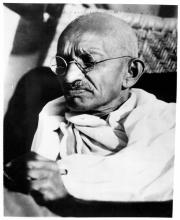non-violence

Could the United States ever do something so heinous that it would become morally necessary for a foreign military to drop bombs on my house? This is the question that was running through my mind on November 11, 2018, when Montclair Presbyterian Church in Oakland, Calif. —a congregation of around 250 souls who were kind enough to invite me to be their pastor five years ago — voted overwhelmingly to embrace pacifism by declaring itself to be a peace church.

The conversation isn’t just about guns, although that’s certainly a huge part of it. We need to look at the bigger picture of how we’ve made violence our norm, how we endorse and encourage it in so many ways.

Pope Francis and Iranian President Hassan Rouhani met for talks on Jan. 26 — the first such encounter since 1999 — in a private meeting in which the pontiff pressed Rouhani on fostering Middle East peace and countering terrorism and arms trafficking.
The 39-minute meeting in the apostolic palace also touched on the landmark deal on Iran’s nuclear capacity that has been praised by the pontiff, and the two leaders discussed the situation of the church in Iran and interreligious dialogue.


Mention the concept of “nonviolent resistance” and two names immediately come to mind: Mahatma Gandhi, the Indian leader who led his nation to independence from British colonial rule, and Martin Luther King Jr., who led the struggle for civil rights in America. Tragically, both champions of nonviolence were assassinated: Gandhi in 1948 and King 20 years later. Today many people throughout the world revere both advocates of nonviolence.
While Gandhi and King were largely successful in their efforts, the question remains whether nonviolent resistance is always the most effective strategy in the face of radical evil, injustice, and aggression. After all, there remains a thin line between nonviolence and martyrdom.
Professor Charles DiSalvo of West Virginia University has recently published “M.K. Gandhi, Attorney at Law: The Man Before the Mahatma,” an excellent study of Gandhi’s 20 years as a young attorney in South Africa where he faced anti-Indian stereotyping and bigotry.
Interestingly, Gandhi’s two closest friends were Jews he knew in Durban and Johannesburg. But despite Gandhi’s personal friendships and his commitment to freedom and security for his own people, he was indifferent, at best, or naive, about the Nazi persecution of Jews.

A new study from the Violence Policy Center found you are more likely to die from gun violence than be killed in a traffic accident in 12 states and the District of Columbia. Motor vehicle fatality are on the decline because of safety measures instituted by the government. Firearms remain as the only consumer product not regulated by a federal agency. The Huffington Post reports:
Overall, there were 31,672 firearm deaths in 2010 and 35,498 motor vehicle deaths. Compare these numbers to 1999, when there were 28,874 firearm deaths and 42,624 motor vehicle deaths.
Read more here.
Rainey is quite a woman. Reared in Nazi-era Germany, she is well known around her adopted city of Seattle for her years of social justice activism. According to the Post-Intelligencer, Rainey even ran for mayor briefly in 2009, and was on her way to attend a city transportation department meeting when, as she was changing buses, she heard a swarm of helicopters over head, figured there was an Occupy demonstration near by and went to investigate.
Whether you agree with the ideology of the Occupy movement or not, Rainey is an inspiration. In an interview last week with Keith Olbermann, the octogenarian activist said that she was energized by the pepper spraying incident and went on to give a shout out to the late Roman Catholic nun, Jackie Hudson (also a life-long peace activist who was arrested several times for protesting at nuclear arms sites), for inspiring her to keep fighting the good fight, even in the winter years of her life.
Rainey recalled Hudson's words of inspiration: "Whatever you do, take one more step out of your comfort zone."